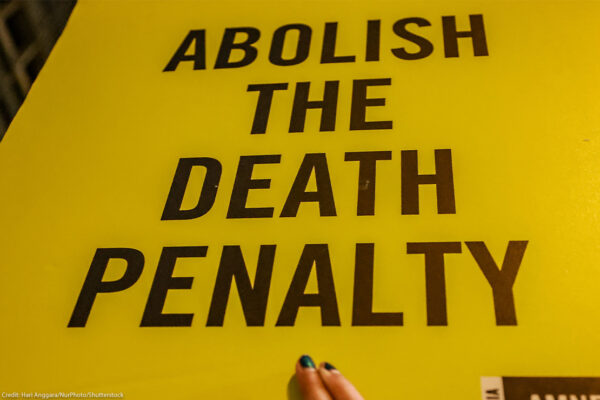
For over three decades in New Hampshire, there has been a rising call to repeal the death penalty. That call has, until recently, gone unanswered. In 2019 that could all change.
Though the Granite State has come close to repeal in the past, too often we have missed the margin by just one or two key legislator’s votes, or were stifled by a gubernatorial veto, first by a Democratic governor, and later a Republican one. The state’s attempt at repeal last year fell just short, but since then, there had been an election. Going into this legislative session, the vote count was more promising than it had been in years.
We entered the new year believing 2019 could, just maybe, be the year for repeal in New Hampshire. The night of the state elections, I was counting votes as the results came in. Some people count party seats or sit on the edge of their seats over a particular candidate. I was doing death penalty repeal math. Because of a recount in one senate district, the math was uncertain for a couple of weeks. When the race was finally called, the math added up to 16 – the magic number for overriding a gubernatorial veto in the State Senate. We were also hopeful about the vote count in the House, which has consistently shown stronger support for repeal than the Senate in past years. From the day House Bill 455 was introduced, there was hope in the air. Conversations in the hallways of the legislative building shifted from “if” to “when.” The word “veto” lost its pervasive vigor and air of absolutism, and was replaced by a new whisper, a new conversation, and finally a new call sign: “veto-proof.”
New Hampshire, which is the last state in New England with the death penalty, is on the cusp of shaking off that unwanted distinction. It is not a credit to one party, but a recognition that in these partisan and divisive times, there is at least one issue that rises above party. Asking the government to take a life summons within us all our common humanity.
The New Hampshire House has 400 legislators, the fourth largest English-speaking parliamentary body in the world. It’s a citizen legislature, of which New Hampshire is very proud. This means we don’t have career politicians who make a living running for office. Each legislator is paid just $100 per year, and representatives have no staff. With roughly 350 people on the floor during any given session day, the House can become rowdy, boisterous, and contentious. Yet the day the House met to vote on HB455 stood apart.
There were lawmakers on both sides of the issue and emotions were running high. Nonetheless, many observing and partaking in the floor debate would later note that it was one of the most solemn debates they’d witnessed. Legislators kept their seats. Silence waited patiently when one senior Republican legislator, Rep. David Welch, was overtaken by emotion talking about his spouse whom he’d lost.
He spoke quietly, with every ear turned towards him, as he explained that he would be voting for repeal for the first time. He could not support a policy, he said, that would cause another family to go through the grief that he himself experienced at the loss of his wife. The death penalty, by definition, causes another family to experience the loss of a loved one.
Another legislator newly elected last November, Rep. Safiya Wazir, also spoke from personal experience, but of a different kind. As a refugee from Afghanistan, she detailed how she previously lived in a country where the government commits grave violence against its own people. The United States and New Hampshire are better than this, she said.
Then there was a familiar voice. Rep. Renny Cushing, whose father and brother-in-law were murdered, is well known by everyone in the House as a leader on repeal. When he rose to explain how the death penalty does not help family members of murder victims, the room listened, pondering whether this could be the last time that he would have to recall the tragedy his family had endured. The death penalty does not do what every family member of a murder victim most wants, he explained. The death penalty does not bring their loved one back – something Rep. Cushing knows intimately from his own family’s tragedy.
All the death penalty does, he said, is widen the circle of violence. And fill another coffin.
The House voted overwhelmingly, 279 to 88, in support of repeal. Or for those doing the math, more than 75 percent of the vote was for repeal, far exceeding the 67 percent necessary to override a veto.
A month later, the Senate took up the bill. While the Senate floor debate proved more strained, the arguments in support of repeal carried a familiar tune. Repeal proponents beckoned legislators to rise above vengeance and listen to their consciences to consider all the harms and human costs involved in the death penalty system.
One senator, Republican Harold French, explained that when he dies and reaches the golden gates, he would have a basket full of regrets and misdeeds. But one misdeed that wouldn’t be in that basket, he said, would be that he hadn’t listened to the concerned citizens who came to him asking him to end this archaic practice.
Sen. French’s remarks were particularly noteworthy because of their contrast with his reasons for voting for repeal the year before. He said he first voted for repeal because of the cost of the death penalty. But this year, he looked beyond cost, to how history will view this issue.
The senator’s voice and perspective harken not to party, but to a shared human philosophy. The call for repeal rises above the fray: the campaign to end the death penalty beckons us to listen to our better angels.
Seventeen senators voted for repeal on April 11. For those doing the math, that is also veto-proof. In the next few weeks, New Hampshire could very well be a state without the death penalty.
The criminal justice system, at its most basic level, is meant to keep our communities safe. It is in conception meant to deter crime by ensuring a consequence for it. It removes people from their communities if they break the law and pose a threat to other people. Incarceration, though often flawed in other ways, achieves those goals without the death penalty. It is this recognition that quietly underscores much of the conversation in New Hampshire.
Our communities, our families, and our state do not need the death penalty. We can live without it.


